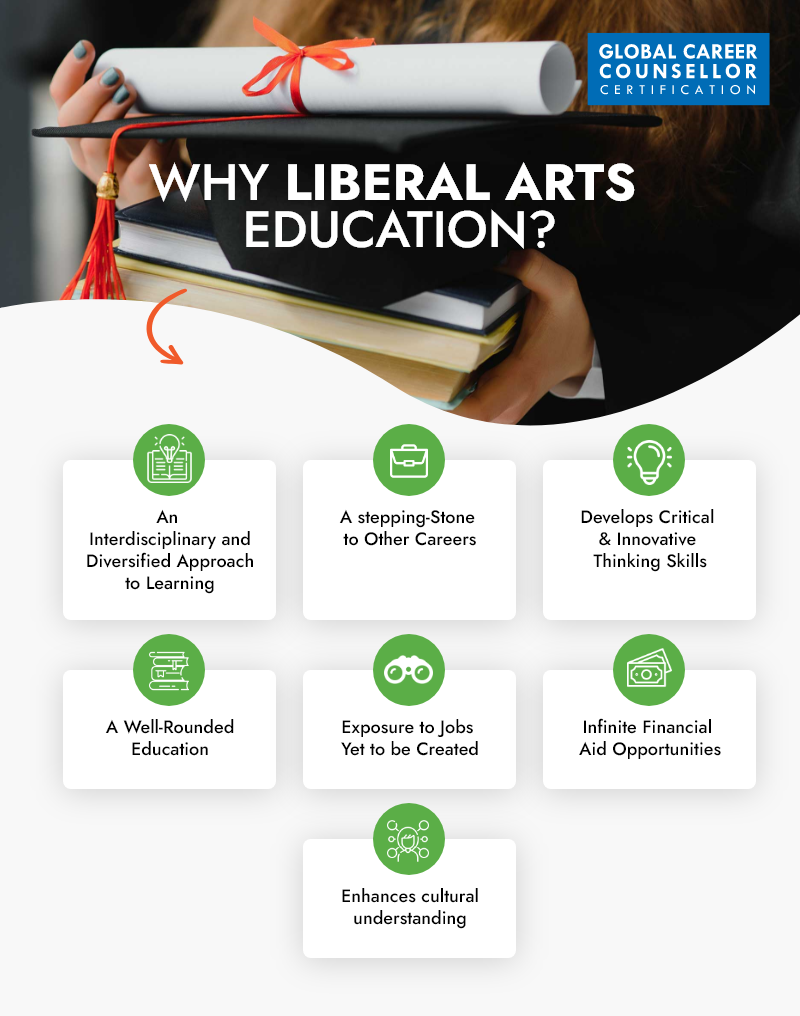In the ever-changing world of education, critical questions have and will be asked about a future in Liberal Arts. All around us are people who claim that a degree in STEM or Commerce is far more valuable in today’s technologically governed age than one in the Liberal Arts. People who claim that a history or philosophy major does not cater to society anymore.
These misconceptions sprout from myths and a lack of knowledge about the term and the subjects it offers.
What is a Liberal Arts Education?
There is a gambit of subjects that fall within the broad spectrum of Liberal Arts; a typical liberal arts degree program is interdisciplinary, with topics from within the humanities, as well as social, natural, and formal sciences. Different institutions offer a varying range of subjects in their programs.
But broadly speaking the liberal arts generally covers the following
- Humanities – art, literature, linguistics, philosophy, religion, ethics, modern foreign languages, music, theatre, speech, classical languages (Latin/Greek) etc.
- Social sciences – history, psychology, law, sociology, politics, gender studies, anthropology, economics, geography, business informatics, etc.
- Natural sciences – astronomy, biology, chemistry, physics, botany, archaeology, zoology, geology, Earth sciences, etc.
- Formal sciences – mathematics, logic, statistics, etc.
The term ‘liberal arts education is also used for the dedicated study of just one of the above subjects. To simply put it, the term refers to degree programs that aim to provide a broad range of knowledge and skills.
A liberal arts education will challenge students to consider not just the problem but also how to solve it, it also trains them to ask which problems to solve and why preparing them for positions of leadership. Its degree offers foundational knowledge in numerous subject areas. Liberal arts students will find themselves exposed to ideas and topics that range from art to science and math. A liberal arts degree provides general knowledge and career-relevant skills that prepare students for a range of professions.
This career option is gaining a lot of new popularity, as more and more people have come to realize that a liberal arts degree is functional, efficient and reliant. People have accepted the reality that works satisfaction is important and it has become an evident priority in the younger generations’ career choices.
A career in Liberal arts is beneficial because it trains an individual with technical as well as academic knowledge to excel in whatever field they pick and at the same time raises their knowledge base and skill set.
Contrary to popular belief, a career in liberal arts is not just about fine arts or performing arts like dance, music or drama. The use of the word “art” has been wrongly understood. In the true essence of the word, art is something created and designed by man. Studies show that everything, be it mathematics, English, music, or sciences, is art.
As the students get exposure to varied fields, they learn to make effective arguments, communicate well, and solve problems. More broadly speaking, liberal arts boosts students’ abilities to think and to communicate clearly.
A liberal arts degree opens a number of doors for students, with job availability in the business, government, education and healthcare sectors. This is largely because of the transferable skills a liberal arts education provides. Students can make their careers in different areas from Psychology to public speaking. Below are some popular majors and career paths one can consider.
Psychology
Psychology, a popular subject that studies human behaviour and how to apply concepts to social and organizational issues that affect us globally. A degree in psychology allows students to step into the following careers:
- Substance Abuse, Behavioural Disorder, and Mental Health Counsellor.
- Market Research Analyst
- Human Resources Specialist and much more.
Communications
Some jobs available with a communications degree are:
- Public Relations Specialist
- Advertising, Promotions or Marketing Manager
- Graphic Designer
English
With creative writing or journalism, students can do storytelling in nonfiction, news, fiction, screenwriting, or poetry genres. This major also prepares them for jobs in journalism, public relations, film, theatre, and advertising, to name a few. Some jobs in the field include:
- Editor
- Technical Writer
Sociology
Studies social behaviour and how people behave in groups, sociology coursework includes history, religion, geography and social science research. Here, students gain an understanding of society’s historical, economic and political issues and how people can work together to solve problems. Roles open to sociology majors include jobs in social services, criminal justice or public health. Some jobs in the field include:
- Social and Community Service Managers
- Health Educators and Community Health Workers
To Conclude, is a liberal arts degree worth it? Think of this – the job market and the skills that are most in-demand in the future may very well be the humanities. Automation and artificial intelligence are affecting everyone. But skills like critical thinking, relationship-building and storytelling resist automation and will continue to be needed in the workforce.
Recommended Read: How to Prepare Grade 9 & 10 Students for College Admissions
Liberal arts studies put emphasis on enduring skills in an era when technology and automation will gradually replace workers
Soft skills are still relevant in the workplace, and students who can demonstrate their creativity in areas such as writing, communication, critical thinking and collaboration will continue to be attractive to employers. There is a growing trend for experts in the “digital humanities,” who can bring digital resources into their research, teaching and publishing.
We are entering an exciting time for liberal arts majors. As more and more jobs become automated, new needs, new jobs and departments that have not even been thought off will materialize. It is here that the liberal arts major will excel because of their ability to connect, and story tell. Adaptability and an open mind will serve liberal arts majors well in the job market.
Make your students choose a career not based on the degree but on their interests. Focus not on a high paying job but to release their thoughts. Make them do what they are good at and ask them to be where their heart lies, for money follows eventually when they put in their heart and soul in the work. As A Result, a career in liberal arts could just be the right choice for students, and if they feel it is, then you should definitely suggest them the same.
If you love helping students in choosing the right career or are already a career counsellor, become the Global Career Counsellor.
The Global Career Counsellor Program by Univariety in Collaboration with UCLA Extension is Asia’s 1st comprehensive online career counselling course for individuals passionate about career counselling. It helps candidates to learn advanced career counselling & guidance skills and offers the chance to learn from industry experts.
To know more about the program,

Michelle Masurkar
With a Bachelor of Arts in Psychology and a Masters Degree in Counselling and Psychotherapy, Michelle is able to address the emotional, social, and behavioural challenges through psychological counselling and consultation. She is a trained Global Career Counselling from the University of California, Los Angeles (UCLA Extension) and has over 20+ years of experience in this field. She has worked with and counselled clients on a number of issues faced by them both professionally and personally. Working with children has always been her passion and this gave rise to her taking up career guidance as a profession.








